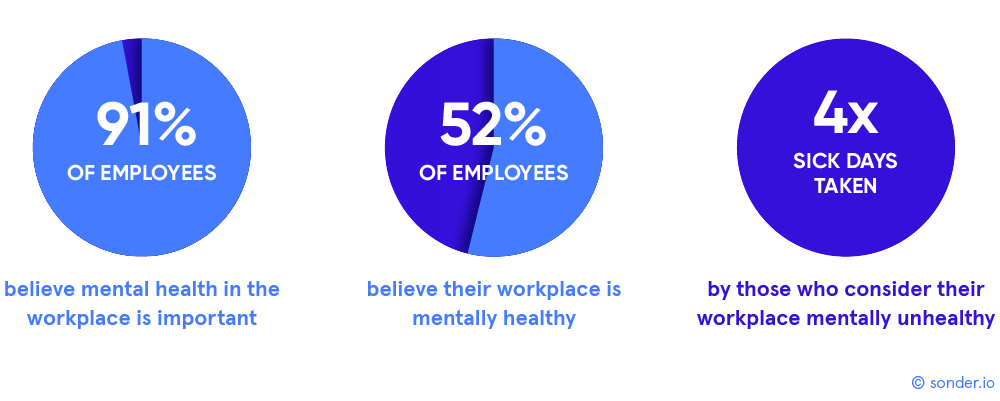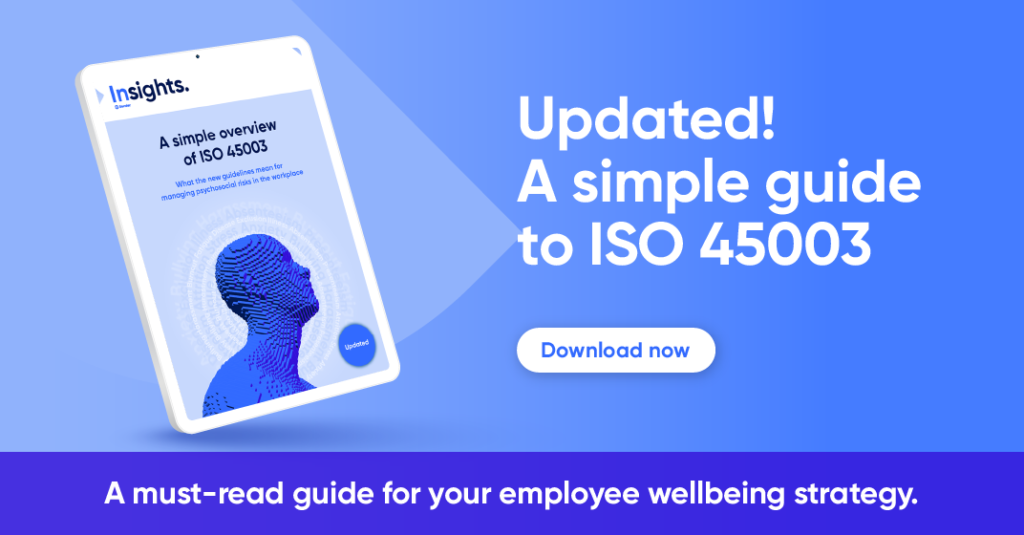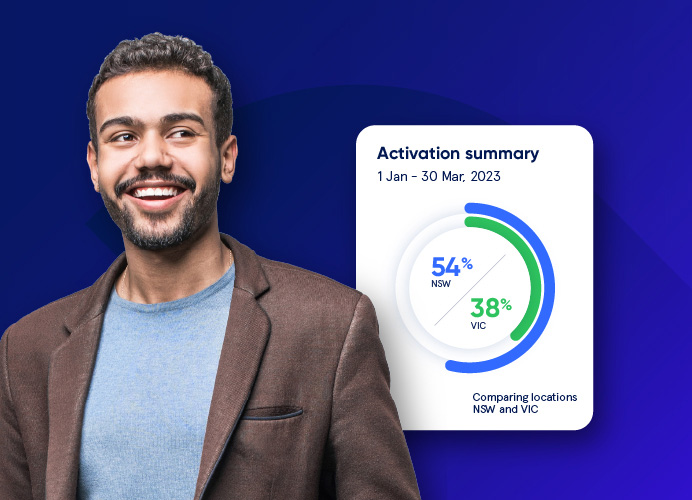Why is ISO 45003 important?

Insights.
In a perfect world, every workplace is safe, every employee is well, every person is engaged and productive, every organisation fulfills its moral and financial objectives, and everyone involved ‘does the right thing’. There are no risks to brand reputation, no workplace harassment claims, no compensation costs, no litigations, no retention issues, and no lives lost to suicide.
In reality, we know that in Australia alone, $543 million/year is paid in compensation for work-related mental health conditions, at least 65,000 suicide attempts are made over the same period, and news feeds are full of #MeToo, burnout, boreout, bullying, harassment and headlines such as, “a quarter of Australian employees are seeking a new job”.
In the past 12 months, CEOs, board members, People and Culture Directors and WHS managers have anxiously watched as:
- In an Australian first, the Administrative Appeals Tribunal of Australia found in favour of a worker’s compensation claim from an Australian Tax Office employee who suffered a psychological injury due to his excessive workload;
- BHP suffered potentially irreparable reputation damage after the media exposed the Australian mining giant’s “culture of cover up” and termination of nearly 50 workers for sexual assaults and harassment at its Western Australian mining camps;
- The federal government - suffering similarly damaging sexual harassment allegations at Parliament House - reviewed the Respect@Work Sexual Harassment National Inquiry Report (2020) and agreed to introduce significant changes to the Fair Work Act and the Sex Discrimination Act, including the confirmation of sexual harassment as grounds for dismissal and the voiding of the get-out-of-jail-free card for members of parliament, judges, and state public servants;
- Burnout stole the limelight at Google, Facebook, LinkedIn, Bumble and Nike, prompting them to give their employees one day, three days, or for the latter three, one week to recover; and
- New Zealand’s Humphries Construction officially sanctioned the use of sick leave for mental health days and gave employees an extra five days of sick leave to recharge.
The launch of ISO 45003 is a timely reminder that organisations have both a responsibility and an incentive to create safe and healthy workplaces if they care about employee wellbeing, recruitment, retention, productivity, innovation, reputation fallout, and organisational resilience.

TNS (2014). State of Workplace Mental Health in Australia.
PwC (2014). Creating a mentally healthy workplace. Return on investment analysis p iv.
Positive outcomes for employees and organisations
ISO 45003 represents an affirmative step towards employee wellbeing because it expands the traditional workplace focus on physical health and safety to consider the equally important workplace need for psychological health and safety. It also gives organisations an opportunity to lead from the front, before compliance is mandated.
Employees and organisations that commit to ISO 45003 and the effective management of psychosocial risks can potentially benefit directly and indirectly, both in the short-term and long-term.
Positive outcomes for employees
- Greater wellbeing at work
- Motivation to perform well
- Clear role clarity and better workload balance
- Peace of mind that work is a safe place
- Diverse and collaborative environment
- Sense of pride in the workplace
- Improved health and health behaviours
- Enhanced job satisfaction
- Increased job productivity
- Less need for workers’ compensation
- Supportive environment for speaking up
- Decreased inclination to quit
Positive outcomes for organisations
- High employee wellbeing rates
- Engaged and high performing workforce
- Reduced performance management and retraining
- Safe and inclusive working environment
- Greater idea sharing and innovation
- Enhanced reputation and ability to attract talent
- Reduced absenteeism and presenteeism
- High retention and lowered recruitment costs
- Improved productivity and work/product quality
- Reduction of workers’ compensation claims
- Less workplace investigations and litigation
- Strengthened organisational resilience
Next steps
The first step is to download our simple guide to ISO 45003, to better understand:
- What is ISO 45003?
- Do organisations need to comply?
- The opportunity
- How does ISO 45003 fit with existing WHS rules and guidelines?
- Work Health and Safety (WHS) in AU/NZ
- Jurisdictional duty
- How can I comply with my duty?
- Definitions
- Psychosocial risks
- Wellbeing at work
- Inside ISO 45003
- FAQ

The second step, if you are a HR or WHS practitioner responsible for ISO 45003 in your organisation, would be to read the full ISO 45003 document (currently available for free here) and potentially complete the excellent free 90-minute Foundations Course offered here. You can also complete a self-audit here.
The third step is to remember that ISO 45003 offers a standard for best practice, not a magic wand. As the ISO states, “The success of psychosocial risk management depends on commitment from all levels and functions of the organisation, especially from top management.”
Perhaps the best advice comes from Mary Ann Baynton, who was instrumental in crafting The National Standard of Canada for Psychological Health and Safety in the Workplace (2013). She suggests that wherever an organisation is on their maturity scale,
“[to] start where you are at. Think about what you’d like to be different... Don’t delay starting to address psychological health and safety because you don’t have the ability to do it all. Just find something... There [are] lots of ways to start, but start.”
Disclaimer
This blog post and ISO 45003 guide cover legal and technical issues in a general way. (Parts of the ISO 45003 guide were prepared in conjunction with McCullough Robertson Lawyers.) They are not designed to express opinions on specific cases. They are intended for information purposes only and should not be regarded as legal advice. Further advice should be obtained before taking action on any issue dealt with in this post.
About Sonder
Sonder is an Active Care technology company that helps organisations improve the wellbeing of their people so they perform at their best. Our mobile app provides immediate, 24/7 support from a team of safety, medical, and mental health professionals - plus onsite help for time-sensitive scenarios. Accredited by the Australian Council on Healthcare Standards (ACHS), our platform gives leaders the insights they need to act on tomorrow's wellbeing challenges today.
Related posts
There's so much more to share
Sonder is reimagining health, safety and wellbeing support. Sonder proves human centric care leads to earlier intervention. Sonder impacts one person at a time to drive meaningful change across an organisation. Sonder understands people and how to support them.






